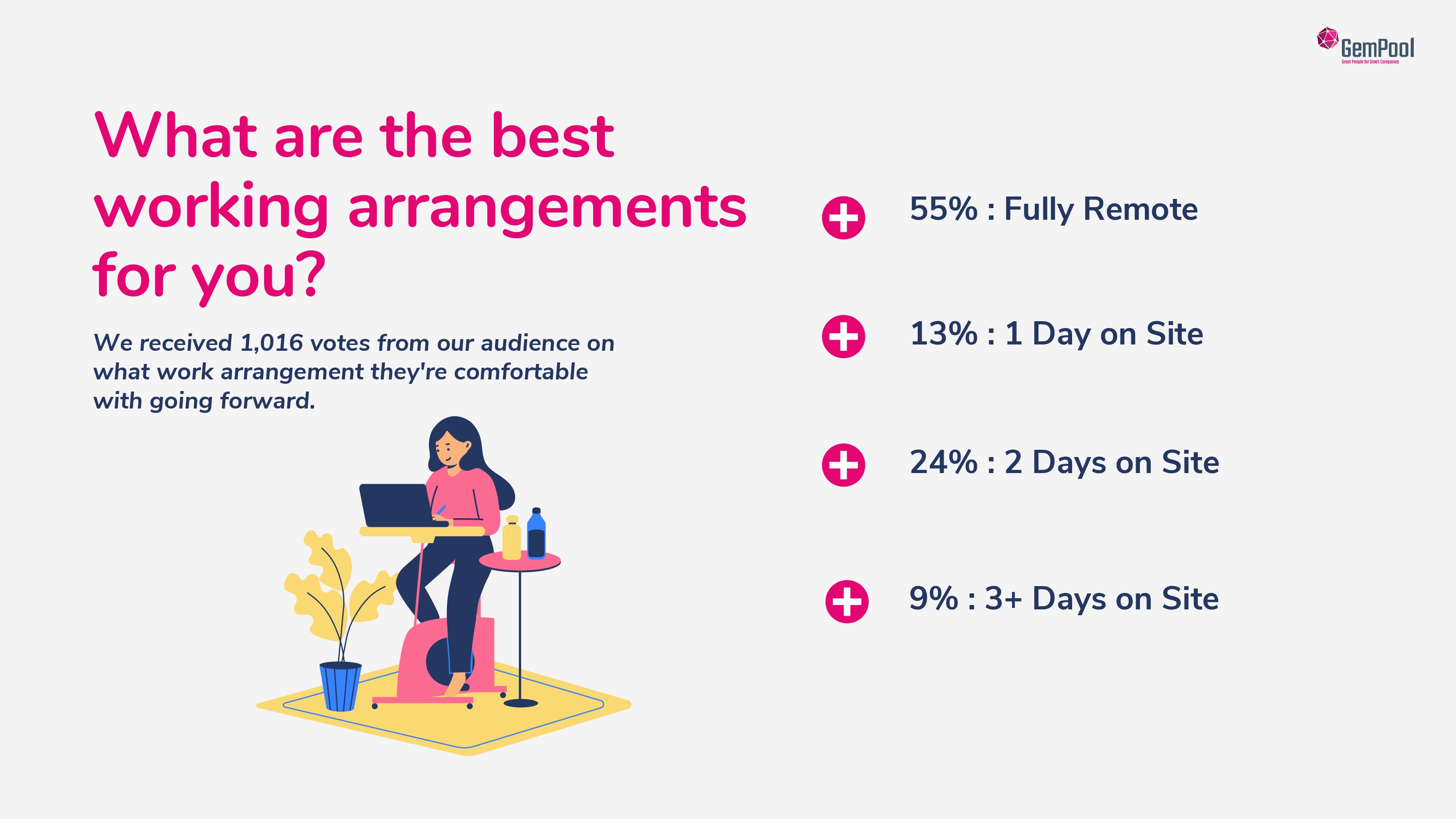
Q4 Market Trends & What to Expect in 2023
Posted on:
by Michael Lantry
IT Jobs and Recruitment Insights
As we approach the end of 2022, it is fair to say that the tech recruitment industry in Ireland has been highly volatile this year. Market salary rates have skyrocketed for many skill sets, benefits packages have had to be reworked, working arrangements have changed fundamentally and the mindset around what people want from their work has shifted.
At GemPool, we track the market movement on salaries, and other trends, each year. With the example of salaries, in previous years like 2017, 2018 or 2019, we saw small increases in market salary rates (for example 5k-10k across a 12 month period). 2022 broke this trend. It's not just with salaries either, we have seen a lot of changes, and the entire working world has evolved more in the last 12 months than it did in the 10 years prior.
In this blog post, I will highlight some of the key trends that we have seen in 2022 and, probably futilely, attempt to predict what we might see in 2023. So what are the big changes or shifts that have happened in 2022?
Hybrid & Remote working
As the tech industry navigated its way out of the pandemic, it has had to navigate its way through the mire of complications that working remotely created. Organisations realised that their staff didn't need to be onsite each day and employee’s themselves have been highly vocal about wanting a better work/life balance and not needing to be in the office.
2022 has been a year of feeling out how to approach this and we have seen companies across the spectrum from going back to five days onsite to being remote first. One thing we know for sure from talking to candidates in the tech market, they have a significant bias towards working remotely. We did a survey with over 1000 respondents asking about their preference and the results were:

What does this mean for the recruitment industry?
Well, it changed what employee’s and potential employee’s see as valuable to them. Organisations have had to adjust their employee value proposition to align to this trend and provide more flexibility in order to retain and attract staff. This includes reimagining how they use their physical workspace and what their teams do, when in the office together. This also meant that the social get togethers employers organise have much more significance than they did in previous years.
Simply put, those employers insisting on staff being on site more than 3 days a week have missed out on great candidates in recruitment this year. They are behind the pack and have struggled to attract staff. They are the organisations that have lost staff during the year, rather than growing.
In the second half of 2022, we have seen the commentary shifting slightly. Now there is more voice to the argument that you need staff together in person to really get the advantage of collaboration and to build a strong culture. This is possibly because there is more clarity on the impact of remote working on culture and inter-colleague relationships.
What does this mean for 2023?
Going into 2023, many employers will continue to walk a tightrope trying to find the perfect balance between wanting to get more employees back onsite, and giving their staff the flexibility that they so dearly value.
This boils down to how you can best build social capital amongst your employees? I dont have the answer to this, but I believe we will see employers pushing harder in 2023 to get their employees back into the office. This will drive more movement of talent as employees seek out employers who align to their needs. Employers will need to find creative ways to encourage their colleagues into the office and make it worth their while. This is very much an ongoing and evolving trend that everyone is watching very closely.
Salaries, benefits & counter offers

We have seen so many crazy things happen this year. To give an example, we had a candidate asking for 90k for a role and was on 80k at the time. Fair enough. We got him the offer at 90k, but then another role he applied into at 90k offered him 100k to try to secure him. He preferred our client, even at the lower salary, so the other company upped their offer to 120k! Just. Like. That. This candidate was offered 30k above asking, without even needing to negotiate. This is just a ridiculous situation but not uncommon in the market in Ireland in 2022.
Particularly in the first half of 2022, there was such demand for talent, that employers were trying so many different ways to try to attract talent and making crazy offers. For example, we would never have seen sign on bonuses for Software Engineers in the past, but this has been far more common in 2022. One big issue employers have had is that they are forced into paying new staff more than established employees at pier level. There is an unfairness to this in my view and many agree. But if you don't get the talent you need, when you need it, you risk missing out on great opportunities for growth. This has been a big challenge for employers.
The microtrend of foreign direct investment companies (such as Meta, Google, TikTok etc.) also offering packages way above market salary rates, has meant that candidates have an inflated sense of the salaries they should ask for. But you could argue, if you can get the salary, then you are worth that level. This drove the start-up tech companies to find alternatives to hiring tech talent in Ireland. It's simply not viable. They are paying too much versus what they can budget and it is very hard to retain them. They have done things like building software engineering teams abroad in places like Portugal and Spain.
Inflation has also played its part in driving up salary demands and pay rises in 2022. All of these factors have led to significant hikes in salary demands.
When it comes to benefits, these too have had to be reimagined. There is far less emphasis on benefits such as free meals, top class work environments and a gym onsite. There is far more credence given to flexibility, support at home, sustainability initiatives and wellness programmes. The big three benefits have been fairly consistent in terms of demand 2022. These are the bonus, health and pension benefits.
We have also seen a counter offer culture that is far more aggressive than in previous years. This is obviously as a result of the difficulty of attracting talent. One example we saw was a candidate getting a counter offer of 100k when they were previously on 68k. It’s a big increase. I don't believe this solves the underlying issues and would actually annoy me if I was the candidate. If you thought I was worth 100k, then pay me that. Don't wait until I try to leave to give me the money.
All of these factors have led to a hugely turbulent recruitment market in 2022. We will be publishing our Tech Salary Guide for 2023 in December. I would wager the data will vary quite a lot from what we published in our Tech Salary Guide for 2022.
What does this mean for 2023?
It is my belief that the turbulence will settle somewhat. Certainly the demand for talent has already slowed, while still remaining strong. Rather than nearly 100% of companies hiring in early 2022, it might be more like 60% of tech companies hiring in 2023. So demand will still be there but less pressure. This is largely due to the economic outlook being less positive so employers are consolidating and watching their spending. I believe that salaries will settle back down to growth levels mentioned previously of 5k-10k over the 12 months, rather than big swings we have seen in 2022.
Benefits packages will also continue to be stable in 2023 with no major changes predicted.
To conclude, these two major shifts in the market in 2022 have created a lot of volatility with talent moving jobs, salaries bouncing around the place and companies grappling with remote workers, hybrid and fully onsite. These issues are not ironed out. 2023 will see more of the same but with more experience in dealing with them, things will probably settle down a bit. But trying to predict the future in our market is really an act in futility. As J.K. Rowling says ‘the consequences of our actions are always so complicated, so diverse, that predicting the future is a very difficult business indeed.’
I would welcome your own views on this. Get in touch and we can chat about the market. You can contact me here or you can find more insights about the tech recruitment market in Ireland from our insights page.






